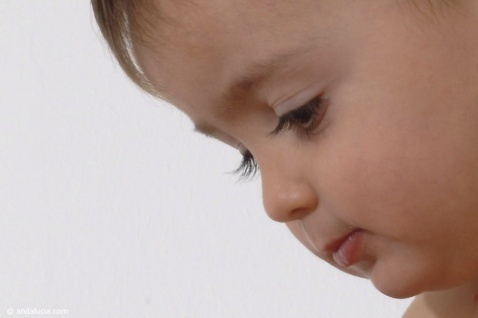
Andalusian customs for feeding your baby © Michelle Chaplow |
|
Super Baby
Following the Andalusian customs for feeding your baby
A baby will, naturally, have to begin little by little getting the digestive system accustomed to new things, once ready for solids. Your pediatrician will recommend when this should be, but generally at about four or five months a baby is ready for grains without gluten; these are sold in pharmacies and supermarkets in a powdered form, to be mixed in with the baby's usual milk. Eventually the baby will be ready for grains with gluten (also sold in the same format), and this is when, depending upon the baby's interest and your vigilance, you can let them have a piece of bread or a teething biscuit to gum every once in a while. Be sure it is a big enough piece so that it won't fit in the mouth (risk of choking), and watch to make sure that no chunks break off either. This is the child's first initiation into "real food". Then bit by bit your pediatrician will tell you what is recommended for each age, only moving on to new things when it appears that the child has tolerated the previous foods well. New foods are usually presented one at a time in order to be able to detect which foods, if any, cause allergic reaction or simply disagree with the child.
Many mothers are used to the doctor's guidelines indicating, for example, first carrots, then potatoes, then green beans, etc, and then go looking for the jars labeled as such at the pharmacy or the supermarket. But why use these prepared products when you can use the freshest ingredients for your baby - just like your Andalusian neighbours? Invest in a hand blender - "mini-pimer", it's called by local housewives, and make your own baby food! It's not nearly as difficult or as much of a hassle as you might think.
Buy enough carrots to make a good carrot purée: one package is usually enough to start with, just wash and peel them, then steam (no salt please). Boiling is fine, but more vitamins and minerals are lost in the water that you when drain off. Put the carrots into a dish, purée with the hand blender, and then serve up enough for the first meal. You can set aside one more portion in the refrigerator for the next day (purées break down fast so no more than this should be left unfrozen), and then, with the remainder, divide it up into similar-size individual portions that you can freeze in plastic sandwich bags or plastic containers (even jars that previously contained some other food work fine, just be sure they are clean).
When your baby moves on to another vegetable, just prepare it in a similar way, adjusting the quantities, cooking and then puréeing the vegetables together for what can often be a very tasty combination (even if it is a bit short on the salt for our taste buds, but they don't need the added sodium). When your baby starts on meats, you can continue to prepare it the same way, just chunk the meat and add it the vegetables. You may want to try stewing it in water, then not draining off too much of the water, as the meat can be dry if it is just steamed. A teaspoon or two of good quality olive oil in the stewing helps too, and what is more Andalusian than that! By the way, these frozen portions can be easily taken with you to a restaurant for your baby's meal (defrosting on the way), and most places are happy to heat it for you and even serve it up on a plate. If you are going to be gone for a few days and will not have a freezer available, it is a good time to buy a few prepared baby foods with the same ingredients that you would normally be serving your child; save the jars and wash them well for freezing your own homemade purées.
Eventually you will be serving fruit purées to your baby, and most fruits don´t need any cooking before puréeing, so you can make these in a moment before needed. Peeled and chunked bananas, apples, pears, peaches, apricots, strawberries, kiwis, etc, all blend well, and you can add in a little orange or tangerine juice when the child is trying citrus also. Sometimes the resulting purée is too thin to serve with a spoon, but if you sprinkle in some of the powdered grain cereal and stir, it should improve the consistency (even a teething biscuit or two will work). Fresh fruit purées, however, discolour and spoil quickly, so only prepare enough to be consumed immediately.
Here are a couple of common recipes for "super" babyfood that are used across Spain:
Fruit Purée
½ apple
½ banana
½ pear
juice of one orange
Prepare the fruit and pure all ingredients together. Add a dash of baby cereal if the mixture needs thickening. Serve at room temperature. Local babies are fed this mixture once or twice daily, especially in the afternoons around "merienda" (afternoon tea) time.
Main Meal Purée
1 carrot
½ potato
1 piece of leek
1 piece of chicken, fish or beef
Boil everything together and then puré (with the water it used for boiling). Add one or two tablespoons of olive oil, mix in well and serve. Mothers in this region typically make this mix daily, changing the vegetables and using a different type of meat or fish each day of the week. The olive oil is supposed to be good for digestion.